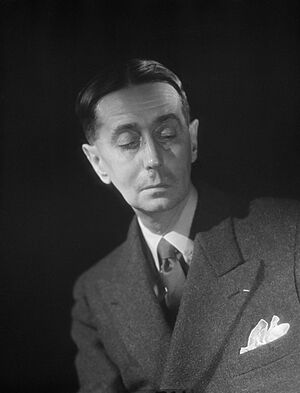Henri Daniel-Rops facts for kids
Quick facts for kids
Henri Daniel-Rops
|
|
|---|---|

Photograph of Daniel-Rops by Studio Harcourt (1950)
|
|
| Born | Henri Jules Charles Petiot 19 January 1901 Épinal, France |
| Died | 27 July 1965 (aged 64) Tresserve, France |
| Pen name | Daniel-Rops, Henri Daniel-Rops |
| Notable works | Nôtre Inquiétude (Our Anxiety, an essay from 1926) L'âme obscure (The Dark Soul, 1929) Jesus and His Times (1945) Daily Life in Palestine at the Time of Christ (1961) |
| Spouse | Madeleine Bouvier |
| Children | Francis Petiot |
Henri Jules Charles Petiot (born January 19, 1901 – died July 27, 1965) was a French writer and historian. He is best known by his pen name, Henri Daniel-Rops. He was a devoted Catholic and wrote many books about history and faith.
Contents
About Henri Daniel-Rops
Henri Daniel-Rops was the son of a military officer. He was a very bright student. He studied law and literature at the University of Grenoble in France.
Early Career and Education
In 1922, when he was just 21 years old, he earned his Agrégation in History. This is a very high teaching qualification in France. He was the youngest person in France to achieve this at the time.
After his studies, he became a history teacher. He taught in different cities like Chambéry, Amiens, and Paris.
Starting His Writing Journey
In the late 1920s, Daniel-Rops began his career as a writer. He wrote an essay called Notre inquiétude (which means Our Anxiety) in 1926. He also wrote a novel titled L'âme obscure (The Dark Soul) in 1929. Besides books, he wrote many articles for different magazines.
His Spiritual Path
Daniel-Rops grew up as a Roman Catholic. However, by the 1920s, he had become an agnostic. This means he wasn't sure if God existed.
In his essay Our Anxiety, he wrote about how people felt lost and confused. This was happening in a world that was becoming more industrial and focused on machines. He saw a lot of sadness and unfairness around him. He wondered if Christianity was still important, especially when Christians seemed to ignore others in need.
He looked at other ideas, like Marxism, which focused on people's money and living conditions. But Daniel-Rops felt that these ideas ignored people's inner, spiritual needs.
In the 1930s, he decided to return to the Catholic Church. He came to believe that even with problems, Christianity was the only way to connect the modern world with people's deeper feelings and needs.
His Literary Works and Influence
After 1931, Daniel-Rops mostly wrote about Catholicism. He was advised by a friend named Gabriel Marcel. They both belonged to a group called the Ordre Nouveau (New Order). This group had new ideas about society and culture.
Spreading New Ideas
Daniel-Rops helped share the ideas of the Ordre Nouveau through his books. It was sometimes hard to tell his own thoughts from the group's teachings. He became an important voice among thinkers in the 1930s who didn't fit into usual ways of thinking. Some of his books from this time include Le Monde sans âme (The World without a Soul).
After 1935, he became less involved with the Ordre Nouveau. He started working with Catholic weekly magazines like Sept and Temps présent. By 1940, he had published many novels, biographies, and essays.
Major Historical Works
From 1941 to 1944, he wrote two important books: Le peuple de la Bible (The People of the Bible) and Jésus et son temps (Jesus and His Times). These were the first of many religious history books he would write. His biggest work was a huge series called Histoire de l'Eglise du Christ (History of the Church of Christ), which he worked on from 1948 to 1965.
After France was freed from occupation in 1944, he stopped teaching. He focused completely on being a Christian historian and writer. He managed a magazine called Ecclésia. He also edited a book series called Je sais, je crois (I know, I believe), which was published in English as The Twentieth Century Encyclopedia of Catholicism. He was one of the most widely read French writers among Catholics after World War II.
Later Life and Recognition
Daniel-Rops also worked with groups that wanted to unite Europe. He joined The Federation and the French Federalist Movement.
From 1957 to 1963, he was one of the fifty leaders of the European Foundation of Culture. In 1955, he was chosen to be a member of the Académie française. This is a very high honor for French writers and scholars.
See also
 In Spanish: Daniel-Rops para niños
In Spanish: Daniel-Rops para niños
 | Percy Lavon Julian |
 | Katherine Johnson |
 | George Washington Carver |
 | Annie Easley |

